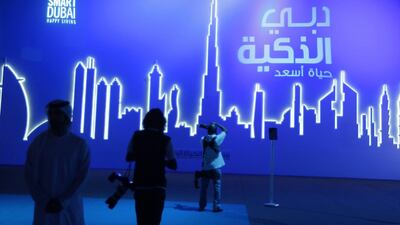The world is heading towards a “smart” future.
The promise of universal access to health care, education and sustainability all through a smartphone seems at a glance a socialist utopia in which solutions to many of the world’s current problems can be resolved with just a few swipes and taps.
But this brave new world is being developed in capitalist societies by profit-seeking companies.
So will the smart city be based on a capitalist or socialist economic structure? Will the cost of these services be within the reach of each citizen? Will they require a monthly fee or will it be on a pay-by-use basis? Or will the current monthly mobile data plan suffice? Or perhaps, as free city wi-fi plans begin to take hold, will all of these services be free?
“It depends on how one defines the capitalist or socialist point of view,” says Daniel Zeff, the chief executive at the creative content agency, Evidently. “A new kind of ‘ism’ will need to be developed in order to respond to the changes we are seeing.”
These changes in which technology is taking over and digitising almost all aspects of our lives, from opening the front door to smart parking, is set to have significant economic and social impact, particularly in the city.
According the UN’s World Urbanisation Prospects 2014, 54 per cent of the world’s population currently live in urban areas. This is set to rise to 66 per cent by 2050.
Urbanisation, according to the United Nations, is integrally connected to the three pillars of sustainable development – economic, social and environmental protection – which require new technologies to address the concerns of each.
"It doesn't conflict with capitalism to create a social infrastructure to increase the common good, access to education to running water. It is in the interest of the world for there to be no poverty, for people to be educated and free from persecution," says Jason Silva, a futurist and host of National Geographic Channel's Brain Games. "Cities lead to tremendous innovation and if we can build the infrastructure that will make better cities where ideas can intermingle and mate, it can only lead to good things."
The GCC is one region that has set its sights on developing smart cities including the UAE’s Smart Dubai initiative and Qatar’s Lusail Smart City.
“A smart city is an efficient, livable and sustainable city, with the resident at the centre and the technology as an enabler to achieve the resident’s needs,” says Mazen Zein, director of strategy and business development and head of smart cities at Schneider Electric. “A smart city is not an expensive city; rather it’s a city of opportunities, quality of life and sustainability.”
It is the improvement of electric grids, gas and water distribution, public transport and roads, commercial and residential buildings, hospitals, homes and other infrastructure that forms the backbone of a city’s efficiency, livability and sustainability.
Manufacturers of the technologies for smart cities believe the services which enable sustainability, reduce the demand of power and provide a more eco-friendly living environment will have benefits to all classes of society, regardless of income.
“These services are not created for a particular class of the society but have a holistic impact on the society,” says Mr Zein.
A smart infrastructure will enable the creation of smart and innovative services, by the companies as well as by the residents themselves. Digital services, like information about traffic or congestion levels, for instance, is one type of services that can be enabled by a smart infrastructure.
But to gain access to these digital services requires access to the internet. While the UAE has the highest smartphone penetration rate in the world, the cost of telecoms is also among the highest. In places like Egypt, where the cost of telecoms and mobile broadband is low, smartphone penetration is also low. If the smart city initiatives were to take place tomorrow, it would mostly be the well-off who could access the full array of services.
“We have food and drive and safety covered, the new basic necessity is wi-fi,” says Nigel Gwilliam, the head of Institute of Practitioners in Advertising in the UK “When the blackouts in New York occurred, people went looking for a place to get internet connection before food or drink.”
According to IDC, government spending on smart cities in the Middle East and Africa is set to top US$8.27 billion this year, an increase of 11.4 per cent as more governments expand their mobile government, online services and mobile broadband networks in a bid to get more people online.
“Achieving smart city status for any city around the globe means it has better growth prospects in terms of its economy as it attracts investment that in turn creates jobs and as a consequence attracts talents who will enhance the city ecosystem, resulting in a virtuous circle for a livable, efficient, sustainable city,” says Mr Zein.
“Governments benefit immensely from efficient infrastructures that lead to increased resource efficiency while directly contributing to monetary savings and a better social inclusiveness and attractiveness.”
thamid@thenational.ae
Follow The National's Business section on Twitter

